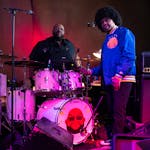At the heart of the Minnesota Orchestra's 2018-19 season is an explosion of American music.
No fewer than 24 U.S. composers are featured — including 11 living ones — for a total of 33 American compositions to be played during the orchestra's mainstream classical concerts. Announced Friday, the season boasts a flagship "American Expressions Festival" (Dec. 31, 2018-Jan. 18, 2019) with four concerts conducted by Music Director Osmo Vänskä. Audiences can expect to hear everything from "Remembering Gatsby" by John Harbison (a featured composer for the 2018-19 season) and "American Nomad" by Twin Cities composer Steve Heitzeg as well as Copland, Gershwin and the late St. Paul composer Stephen Paulus.
Symphonies by Samuel Barber and Howard Hanson also feature in the festival (both can be heard Jan. 10-11). The jewel in the crown, though, is the rare opportunity to hear a symphony by Florence Price, a composer who became the first African-American woman to have her music performed by a major symphony orchestra in 1933 (Jan. 12-13, 2019).
Vänskä's embrace of American music extends far beyond the American Expressions Festival. At the season-opening concerts (Sept. 21-22) he will conduct Joan Tower's "Fanfare for the Uncommon Woman No. 1" followed by Copland's "Appalachian Spring," a quintessential piece of American classical music. In all, Vänskä will lead 21 pieces of American music in the new season, an impressive total for a conductor not previously known for his commitment to American music. Needless to say, the inclusion of so many U.S. composers in the 2018-19 season is hugely encouraging and a major step from the relatively conservative repertoire choices that characterized recent Minnesota Orchestra seasons.
Vänskä also continues his exploration of Mahler's symphonies, all of which are being recorded by the Swedish record label BIS. Minnesota Orchestra recordings of two symphonies — Nos. 5 and 6 — have already been issued, with the 2018-19 season bringing live performances of the inventive Seventh (Nov. 2-3) and the death-haunted Tenth — a symphony left unfinished by Mahler but completed by musicologist Deryck Cooke (June 13-15, 2109). Vänskä's Mahler style is bracingly direct and unsentimental, making both concerts unmissable season highlights.
It's also refreshing to see deliberate efforts on programming women composers for the 2018-19 season, at a time when arts organizations are rightly under pressure to improve gender equity. Works by eight female composers feature in the orchestra's classical concerts — not revolutionary, perhaps, but undoubtedly a step in the right direction. Of particular note is the opportunity to hear the "Gaelic" Symphony by Amy Beach, a pioneering composer (April 13, 2019). Beach blazed a lonely trail in 19th-century America. Today, her music is less widely heard than it should be.
Evidence of gender balance is harder to find in the list of guest conductors appearing with the orchestra. Just two of the season's 14 guests are women: English conductor Jane Glover (Jan. 31-Feb. 1, 2019) and South Korean Han-Na Chang (April 4-6, 2019). Greater efforts should be made to attract highly talented women such as Mirga Gražinytė-Tyla (music director at the City of Birmingham Symphony Orchestra in England) and Susanna Mälkki (chief conductor of the Helsinki Philharmonic).
The situation is little better when it comes to guest soloists. Of the 16 guest instrumentalists, four are women.
The quality of soloists is unquestionably high, though, especially for listeners who love the piano. The season features many established piano stars, including Emanuel Ax (Sept. 21-22), Nikolai Lugansky (Feb. 7-9, 2019), Stephen Hough (April 4-6, 2019) and Till Fellner (June 6-7, 2019).
Among the soloists making their Minnesota Orchestra debuts, a standout is brilliant young Russian-British violinist Alina Ibragimova (March 21-22, 2019). She'll play Schumann's Violin Concerto — another sign the orchestra wants to avoid the obvious with its classical programming.
Most intriguing of all, perhaps, is the return of dazzling Scottish percussionist Colin Currie (March 14-16, 2019). An inspiring program features the U.S. premiere of English composer Mark-Anthony Turnage's "Martland Memorial," with Currie tussling on aluphone, a slide whistle, a duck call and a motor horn, among other instruments. The 2018-19 season features 12 more works getting their first Minnesota Orchestra performance, including pieces by John Adams, Sean Shepherd and Victoria Borisova-Ollas.
Classics with a twist
Lovers of traditional repertoire shouldn't worry, however. The season also features symphonies by Beethoven, Brahms and Bruckner as well as Bach's Christmas Oratorio (Dec. 8-9). Verdi's Requiem, led by outstanding conductor Edward Gardner, is the season's other choral blockbuster (May 17-19, 2019).
And while Sibelius is a Vänskä specialty, just one of his pieces ("Tapiola," April 25-27, 2019) is included in the 2018-19 season. Disappointing? Not so much. The Finnish composer all too often became an automatic go-to option in recent seasons. It's refreshing to hear something different.
Away from the core classical concerts, the orchestra will continue its Live at Orchestra Hall series, spotlighting varied genres of music-making. Artists performing with the orchestra for this series include Minneapolis rap vocalist Dessa (Oct. 5-6), jazz singer Gregory Porter (Dec. 1) and folk-rock duo Indigo Girls (Feb. 15, 2019).
The popular Orchestra Hall movie nights also continue, with live orchestral accompaniments to big-screen showings of "Harry Potter and the Prisoner of Azkaban" (Oct. 26-28), "Jurassic Park" (Nov. 24-25), "Star Wars: A New Hope" (Jan. 3-6, 2019) and "Star Trek: Into Darkness" (March 29-30, 2019). The richly varied season also includes chamber music and jazz series, Saturday morning yoga sessions with live music, a weeklong Common Chords community residency in north Minneapolis and a first-ever engagement with the U.S. Naval Academy Glee Club (Nov. 10).
The 2018-19 season strikingly blends old classical favorites with new faces, plus it makes a thrilling commitment to American composers. Yes, there will an exciting buzz when Vänskä takes the podium this fall. This season features bolder, more imaginative programming than any in recent history.
Terry Blain is a freelance classical music critic for the Star Tribune. Reach him at artsblain@gmail.com.






